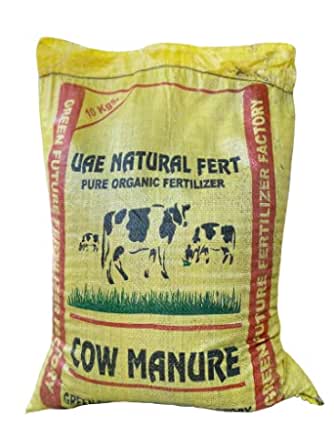Description
Cow manure is a valuable organic fertilizer and soil amendment made from the waste products of cattle. Here’s some information about cow manure and its benefits in gardening and agriculture:
- Nutrient Content: Cow manure is rich in organic matter and essential nutrients, including nitrogen (N), phosphorus (P), and potassium (K), as well as micronutrients such as calcium, magnesium, and sulfur. These nutrients are released slowly as the manure decomposes, providing a long-lasting source of nutrition for plants.
- Soil Amendment: Adding cow manure to soil improves its structure, fertility, and water retention capacity. It helps loosen heavy clay soils, allowing for better drainage and root penetration, while also increasing the water-holding capacity of sandy soils.
- Organic Matter: Cow manure is an excellent source of organic matter, which improves soil health by promoting microbial activity, enhancing soil structure, and increasing nutrient availability to plants. Organic matter also helps reduce soil erosion and compaction.
- pH Regulation: Cow manure typically has a near-neutral pH, which can help buffer soil pH and maintain it within the optimal range for plant growth. It can be particularly beneficial for acidic soils, helping to raise pH levels over time.
- Composting: Cow manure can be composted to further enhance its nutrient content and reduce the risk of weed seeds and pathogens. Composting cow manure with other organic materials, such as straw, leaves, or kitchen scraps, creates a nutrient-rich compost that can be used as a soil amendment or organic fertilizer.
- Application: Cow manure can be applied to gardens, flower beds, and agricultural fields in several ways, including:
- Mixing it into the soil before planting.
- Applying it as a topdressing around established plants.
- Incorporating it into compost piles to accelerate decomposition.
- Safety Considerations: Fresh cow manure can be high in nitrogen and may burn plants if applied directly without composting or aging. Additionally, manure from confined animal feeding operations (CAFOs) may contain antibiotics or hormones used in livestock production, so it’s advisable to source manure from organic or pasture-raised cattle when possible.
Overall, cow manure is a valuable resource for improving soil fertility, structure, and health in gardens and agricultural fields. When used responsibly and in conjunction with other organic practices, it can contribute to sustainable and environmentally friendly gardening and farming practices.






Reviews
There are no reviews yet.